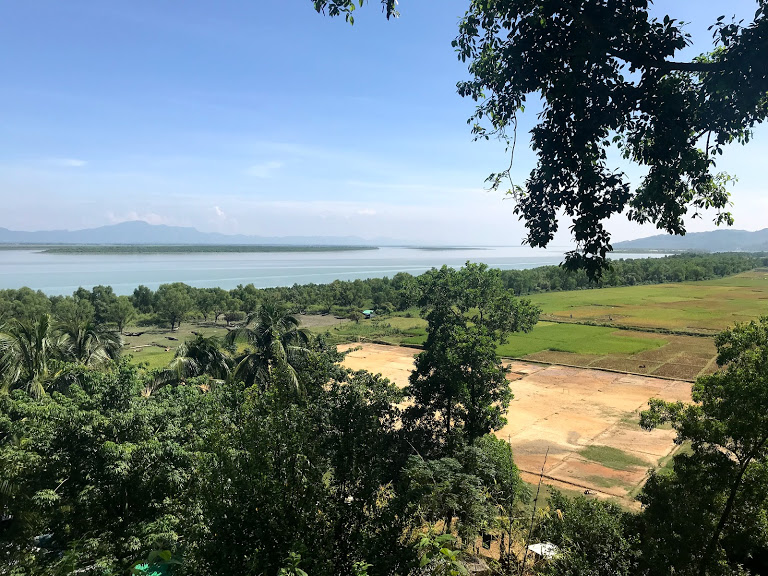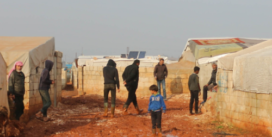- Fall Newsletter, 2025, Issue 15
- Using International Online Learning Modules to Engage Students in the Study of Critical Global Issues
- Upcoming Book Launch: Hearts of Freedom
- Announcing winners of the 2025 CARFMS Essay Contest
- The New York Declaration for Refugees and Migrants and its two Global Compacts: Addressing the Symptoms or the “Root Causes” of Forced Displacement?*
Unpacking the knowledge-practices of the “collective self”: The Rohingya social movement in Canada

Yuriko Cowper-Smith holds a Ph.D. in Political Science and International Development from the University of Guelph. Her main research interests lie in migration, statelessness, and social movements, and her dissertation research investigates the Rohingya social movement in Canada. For three years, she has worked with this diaspora community by volunteering, organizing and attending events, and raising public awareness about the refugee crisis and genocide through her research and writing. Yuriko’s research was supported by an Ontario Graduate Fellowship and an Ontario Graduate Scholarship. She currently works with The Sentinel Project, a non-profit organization that tracks early signs of genocide, and the Canadian Centre on Statelessness. In 2018, Yuriko visited the Rohingya refugee camps in Cox’s Bazar, Bangladesh.
Rohingya activists in Canada have built a social movement around the genocide they face in Myanmar and the refugee crisis in Bangladesh. In my research with the Rohingya social movement in Canada, I find that one of the movement’s key features is the development of knowledge-practices (Casas-Cortes, Osterweil & Powell, 2008). Knowledge-practices are sites where knowledge is generated, modified and mobilized (Ibid). To make this point in my research, I draw on della Porta and Pavan’s (2017) repertoire of knowledge-practices in social movements where they categorize them into four groups: collective self, action network, political alternatives, and transmission.
This typology frames the main findings of my dissertation, and in this blog, I elaborate on the knowledge-practices of collective self. Knowledge-practices of collective self-refer to the processes in which individual experiences and thought processes merge into a larger cosmology that guides action (Eyerman & Jamison, 1991). Pavan and Felicetti (2019) define them as “the vision that grounds a collective endeavor as well as the envisaged or actual practices that transform this vision into reality” (pp. 3-4). In other words, these knowledge-practices are the ethos or the political vision of a social movement (della Porta & Pavan, 2017).
To demonstrate how a movement develops knowledge-practices of this kind, I share a conversation with three Rohingya activists in Toronto and Ottawa. Accordingly, the activists describe why they got involved in the movement, their hopes, and what they have achieved in Canada vis-à-vis their efforts. In this instance, instead of focusing on specific advocacy points such as the push to put forward a case in front of the International Court of Justice (ICJ), I look at how personal, individual reasons and motivations for getting involved, merge into the philosophy of the larger movement. To do so, I will first discuss the movement’s ethos and then describe its political vision.
The Ethos of the Movement
Three primary motivations guide the movement’s ethos: responsibility, awareness, and resolve to put an end to the genocide and refugee crisis on their terms. First, in discussing the reasons for getting involved in advocacy work, the three activists described their responsibility to the Rohingya community. For example, one activist noted,
I consider myself very lucky to have achieved a high level of education, which is very rare among our people, not because they don’t want it, but because structural obstacles and countless reasons out of their control stand in their way. Therefore, I believe that I am obliged to serve my community in any way possible, and so that’s how advocacy fits in.
Similarly, another activist underlined,
Being voiceless at one point in my life, it is almost like a moral responsibility to use this newly gained voice to advocate for those who are still voiceless. Advocacy to me is using my voice to make the voice of the voiceless heard. I see advocacy as the forerunner and/or the engine behind some of the great laws with huge impacts on millions of lives and nature. It is advocacy that often helps develop and set the norm before the majority accepts it, often by refusing to accept the existing norm in a forceful way (if need be).
Second, activists’ experiences turned their sense of responsibility into an acute awareness of their positionality as a diaspora group. By becoming involved in activism, the activists learned about their subject-positions within existing power relations in Canada and abroad. They learned about the forces underlying the issues they are campaigning on and the nature of the opposition they face (locally and internationally). They critically questioned the forces of domination in which they are implicated to envision more progressive forms of social relations for their community. For example, they discuss Islamophobia in Canada, the international community’s reticence in intervening, and other geopolitical factors that undergird the possible options for accountability and justice.
Third, the activists commented on the importance of their own voices, sharing their beliefs that those who have experienced genocide, statelessness, and migration have a keen sense of what a resolution to the refugee crisis and genocide should entail. They underlined that Rohingya people are often not considered decision-makers and are not called upon to speak to potential interventions, policy options, and other actions affecting their community. Thus, they point out that Rohingyas’ resolve to self-represent in the diaspora is a critical viewpoint that undergirds Canada’s movement.
The Political Vision of the Movement
Beyond the movement’s ethos, the political vision is another aspect of the knowledge-practices of collective self. The political vision of the movement in Canada is a bit more specific than the ethos, as it presents the ultimate goal of the movement. In this case, the vision encompasses bringing increased recognition of the situation to Canadians to reinstate Rohingyas’ citizenship in their homeland. For the activists, restoring the missing rights and citizenship of those remaining in Myanmar are critical. Without rights and citizenship, Rohingyas cannot return home with safety, security, and dignity.
Border of Bangladesh and Myanmar,
along the Naf river, on the Bangladeshi side
To describe the political vision of the movement in Canada, Bangladesh, and Myanmar, the three activists qualified that the “vision for the Rohingya community in different places will be different based on socio-economic and political barriers they face. While those in Canada are starting to settle down and become self-sufficient, those in Myanmar and Bangladesh are merely trying to survive day-to-day and meet their basic needs.” However, they highlighted that “regardless of geography and the types of political punishments that Rohingya face in different parts of the world, a unified vision is to go back/live peacefully in our homeland.” Or, as one activist says,
Today, I see a strong social movement and commitment from Rohingya themselves demanding change and betterment of our people’s lives – surely not enough – but we’ve just begun our work. The demographic spread of Rohingya communities, especially in first world countries such as Canada, enables us to approach the government to condemn the genocide against Rohingya. In the case of Bangladesh, it is the largest hosting country of more than one million Rohingya. However, we understand the country has limited capabilities and different priorities. So, our role, with the permission of the Bangladeshi government, is to aid these refugee camps with basic necessities to survive, until our rights in Myanmar are restored prior to repatriation. I strongly believe that our people in Canada will thrive while ensuring our Rohingya people in refugee camps survive. We will keep advocating for the right cause which is full recognition and compensation from the Myanmar government to the Rohingya people and other ethnic minorities.
These activists and the broader movement are pursuing this goal through various social, political and legal channels. In light of this goal, the activists want to create awareness of their cause in Canada. For instance, one activist further emphasized that,
Unfortunately, there are a considerable number of people who are not aware of where Myanmar is located, let alone know the situation in Myanmar. At the basic level, I want to raise awareness of what happened in Myanmar throughout the last seven decades, and what is still happening now. I want to draw attention to the Rohingya communities who live in the Middle East, South Asia, South East Asia, Australia and the Americas, and advocate in terms of securing their basic human rights such as education, health, legal status, etc.
In describing their impacts and accomplishments in Canada for this purpose, one activist spoke of the inroads they have made in generating solidarity and support from Canadians and the Government of Canada. He pointed out that the Canadian government declared the Rohingya atrocity a genocide, removed the honorary Canadian citizenship of Aung San Suu Kyi, and committed $300 million in funding over the next three years to respond to the Rohingya crisis.
Conclusion
This short piece highlights the knowledge-practices of the collective self of the Rohingya social movement in Canada. As briefly shown, the practices involve developing an ethos and political vision. The discussion above contemplates the significance of knowledge-practices for diaspora-led social movements working towards political change in a country that does not consider them rightful citizens. These findings compel researchers and academics to recognize and engage with social movements’ intellectual activities.
Works Cited
Casas-Cortés, M., Osterweil, M., & Powell, D. (2008). Blurring boundaries: Recognizing knowledge-practices in the study of social movements. Anthropological Quarterly, 81(1), 17-58. Retrieved from www.jstor.org/stable/30052739
Della Porta, D., & Pavan, E. (2017). Repertoires of knowledge practices: Social movements in times of crisis. Qualitative Research in Organizations and Management: An International Journal, 12(4), 297–314. Retrieved from https://doi.org/10.1108/QROM-01-2017-1483
Eyerman, R., & Jamison, A. (1991). Social movements : a cognitive approach. Pennsylvania State University Press.
Pavan, E., & Felicetti, A. (2019). Digital media and knowledge production within social movements: Insights from the transition movement in Italy. Social Media + Society, 5(4), Retrieved from https://doi.org/10.1177/2056305119889671


